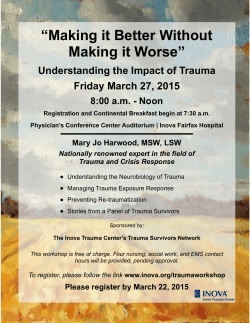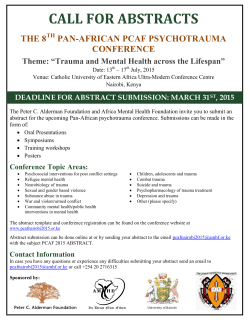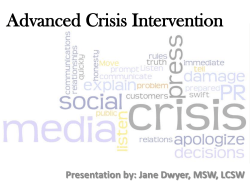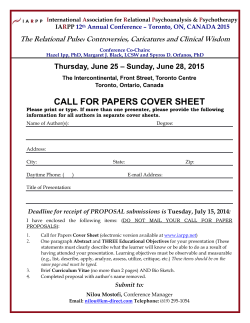
The Whole Sphere
The Sphere model: Assessing the impact from trauma Nicki Weld Stand Children Services, Aotearoa, New Zealand Relational trauma The range of maltreatment, interpersonal violence, abuse, assault, and neglect experiences encountered by children and adolescents including: • Familial- physical, sexual, emotional abuse. • Community – peer, and school based assault, molestation, and severe bullying. • Severe physical, medical, and emotional neglect. • Witnessing domestic violence. • The impact of serious and pervasive disruptions in caregiving as a consequence of severe caregiver mental illness, substance abuse, criminal involvement, or abrupt separation and traumatic loss. (D’Andrea et al. 2012) Whole of Person Impacts Trauma affects the whole sphere of a person: mind, brain, body, spirit, sense of hope and future, relationships with others, and the ability to positively engage in community: • • • • • • Spiritual Physical Hope and sense of future Emotions and thoughts Relational Engagement with wider environment Spiritual Physical Hope Perceive self as wrong, damaged, bad or defective. Lack of self-esteem and sense of self-worth. High sense of shame. Self-blame and guilt. Perceives self as a failure or bad, useless, negative. Distorted locus of control. Low self efficacy. Unable to name positive aspects of their self. Negative self-image. Sleep difficulties. Substance abuse and other addictive behaviours. Problems with concentration. Sexualised behaviors. Self-mutilation and selfharming. Startle easily. Eating and food issues. Risk taking and impulsivity. Difficulty with learning. Intrusive or unusual physical self- soothing behaviour. Higher than average resting heart rate. Auto immune problems- skin, respiratory, less resistance to infection. Headaches, stomach pains, other pain. Restless and relentless physical activity. Higher risk in later life of chronic physical disease. Foreshortened sense of future. Absence of meaning, purpose, connection. Loss of hope Demoralised, pervading sense of hopelessness. Can’t name future goals or hopes. Short term reactive thinking – long term thinking and planning not so evident. Emotions and thoughts Relational Engagement Anxiety/fears Helplessness Sadness Shame Poorly controlled anger – highly reactive. Difficulty concentrating – inattention, forgetfulness. Depression Dissociation Catastrophising Hyper-vigilance Misguided sense of justice Interference with normal memory processing- too much, too little, preoccupied by the past. Intrusive thoughts. Attention to threat while ignoring less threatening but important information. Difficulties working through losses. Obsessive or pre occupied behaviours. Suicidal thoughts or attempts. Difficulties expressing emotions in words. Behavioral outbursts. Attachment difficulties. Reactive and defensive. Expectation of harm or threat from others. Use of violence. Lack of trust. Lack of empathy. Problems communicating needs. Not recognising/responding to danger or lack of safety. Over interpretation of non-verbal and facial cues. Hypersensitivity to even minor threat. Difficulties resolving conflicts. Impaired parenting – intergenerational transmission of trauma. Control issues linked to sense of helplessness. Sexual risk taking. High interpersonal conflict. Difficulty parenting Withdrawal/social difficulties Lack of connection to wider community. Difficulty with group activities. Difficulty in school and employment. Bullying and being bullied. Seeking of belonging beyond the family system. Disrupted sense of morality - can’t differentiate between right and wrong. Responds to many things as threat to life – issues with aggression and impulse control. Lack of self-protective qualities. Errors in judgment in interpersonal reasoning leading to odd social behaviours Homelessness and transient behaviour. Criminal activities. Sense of entitlement The Three Houses tool for Children House of Worries House of Good things Weld 2015 House of Hopes and dreams The Three Houses well-being self assessment - adults Worries Strengths Spiritual Spiritual thoughts Weld 2015 Aspirations Goals Future picture Engagement Emotions and Relationships Physical Engagement thoughts Relationships Emotions and Engagement Relationships Physical Spiritual well-being (sense of self-worth, identity, values, selfesteem, self-efficacy). Strengths Worries Has a value around kindness. Low self-worth – sees self as ‘weird’ and dumb. Can’t name strengths about himself. Not clear about his culture or how this relates to his identity. In good physical health Lacks physical confidence Uncomfortable in his body Loses focus and has accidents. Difficulty with team sports. Self-soothing of skin picking Physical well-being (physical health, self-care, sleep, nutrition, exercise). Hope (sense of future, selfbelief, motivation, goals, and strengths). Likes to draw, interest in maths. Sense of humour. Can’t see a future, thinks he’ll be dead. Low confidence and lack of goals. Emotional well-being (thoughts, feelings, mood). Sometimes removes himself when stressed to his room. Trouble with self –regulation- shouting, swearing, running off, shoving other kids. Loses focus and has trouble with concentration. Sadness around his father dying. Relational well-being (relationships, family, friendships, supports). Engagement (sense of connection, belonging, activities, work, school). Cares about his Mum (empathy) Sense of humour Has made one friendship connection. Can seek comfort and help. Attends school and has a supportive teacher. Good school attendance overall. Possible avoidant dismissive attachment disorder linked to early childhood neglect and exposure to violence. Difficulty reading social cues – conversations and physical boundaries. No male role model Few friends Exposure to violence and unstable adult relationships and the impact of this on his learning about relationships. Can be aloof and distant No connection to his Dad’s family. Socially isolated not well connected to community – not in any social, sports, or activity groups. Lacks confidence in his ability at school, mainly due to his reading difficulty and trouble with physical sports and activities. Is often late to school. Intervention - Being whole and well. All aspects of our self need to be in balance and connected for us to be whole and well. To do this we need to attend to well-being and trauma recovery in the same six aspects that trauma impacts: SPIRITUAL WELLBEING strengthen sense of self- concept, build new and positive meaning and identity, replace negative narratives with acceptance and awareness. Increase self-worth, identity, culture, values, beliefs, and traditions, turangawaewae. Weld 2015 Physical well-being –. diet, sleep, self-care, exercise, relaxation - support the central nervous system and impacts– integration, self acceptance, appreciation, balancing, attending to hyper-arousal, reactivity, addiction, and impulsivity. Weld 2015 sense of Hope – sense of future, self-belief, motivation, goals, and strengths, sense of purpose – having meaning and looking forward, inspiration, motivation, developing dreams, selfbelief, future safety. Weld 2015 EMOTIONAL WELLBEING – having emotional awareness, language and management. Working with loss, fear, and anger. Developing mindfulness and seeing the link between thoughts, feelings, and behaviour, having replacement thoughts and able to use self talk. Weld 2015 RELATIONAL WELLBEINGrelationships, attachment, family, friendships, having strong, safe, and supportive relationships – understanding ways to build healthy connections and communication with immediate and extended family and others. Attending to attachment issues and building relational safety. We.ld 2015 Sense of ENGAGEMENT - experiencing belonging and social connection to community – school, work, being able to contribute in positive ways, teams, activities, service to others, helping, having a support network of people from different places, having purpose and meaning. Weld 2015 Each aspect of the sphere connects - we need to consciously assess and attend to each of them to support well-being and recovery from relational trauma. Emotional Hope Relational SPIRITUAL Physical Engagement “Nicki Weld has written a clear, passionate and accessible guidebook to help people along the road to recovery from adversity and trauma. She recognizes that healing is not only about the body or the mind, but about the soul as well.” Sandra L. Bloom, M.D. Available at : www. fishpond.co.nz Nicki.Weld@standforchildren.org.nz
© Copyright 2025















